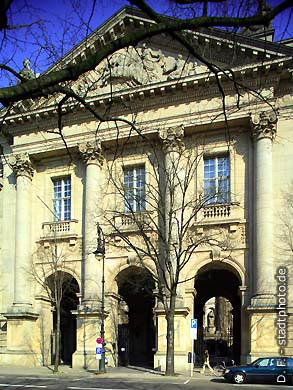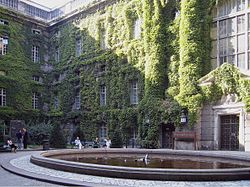Die Preußische Staatsbibliothek

Die Preußische Staatsbibliothek
The Prussian State Library
Along Unter den Linden in Berlin, some distance east of Brandenburger Tor but considerably west of Alexanderplatz and Fernsehturm, stands the Staatsbibliothek zu Berlin. In the distant but hardly forgotten past this beautiful building bore a more assertive name: Die Preußische Staatsbibliothek. The Prussian State Library.
 Unter den Linden is lined with beautiful buildings, and many of them speak more overtly to the ebb and flow of modern German history. It takes a grotesquely lazy tourist to overlook the stunning reconstruction of the Reichstag, for instance. Touring the publicly accessible portion of the old parliament building, restored to its proper place as the seat of national government, helps even a casual visitor understand how a united, democratic Germany fulfills through living architecture the twin promises that the Reichstag has made: Dem Deutschen Völke and Der Bevölkerung. To the German People and To the Population.
Unter den Linden is lined with beautiful buildings, and many of them speak more overtly to the ebb and flow of modern German history. It takes a grotesquely lazy tourist to overlook the stunning reconstruction of the Reichstag, for instance. Touring the publicly accessible portion of the old parliament building, restored to its proper place as the seat of national government, helps even a casual visitor understand how a united, democratic Germany fulfills through living architecture the twin promises that the Reichstag has made: Dem Deutschen Völke and Der Bevölkerung. To the German People and To the Population. For those who approach Germany from the admittedly peculiar cultural prism of the American South, however, die Preußische Staatsbibliothek represents an obligatory visit in its own right. All Berlin, to the socially progressive Southerner, represents what our own "Heimat" should become. Reunited Berlin, once and rightful capital of Germany, after conquest, occupation, partition, disarmament, and global humiliation scarcely commensurate for Germany's crimes against humanity. If only Atlanta, Columbia, Birmingham, Nashville, and Richmond could be comparably redeemed from their own history. And there in the heart of Berlin, mere yards from the din of Unter den Linden, the courtyard of the old Prussian State Library beckons. This was the same ivy-covered oasis that greeted visitors and employees of the Library and its cousin, Die Preußische Akademie der Wissenschaften (the Prussian Academy of Sciences).
For those who approach Germany from the admittedly peculiar cultural prism of the American South, however, die Preußische Staatsbibliothek represents an obligatory visit in its own right. All Berlin, to the socially progressive Southerner, represents what our own "Heimat" should become. Reunited Berlin, once and rightful capital of Germany, after conquest, occupation, partition, disarmament, and global humiliation scarcely commensurate for Germany's crimes against humanity. If only Atlanta, Columbia, Birmingham, Nashville, and Richmond could be comparably redeemed from their own history. And there in the heart of Berlin, mere yards from the din of Unter den Linden, the courtyard of the old Prussian State Library beckons. This was the same ivy-covered oasis that greeted visitors and employees of the Library and its cousin, Die Preußische Akademie der Wissenschaften (the Prussian Academy of Sciences).Within the courtyard, a single inscription will stand out: MCMXIII. 1913. The year before it all began unraveling and Germany found itself on an often hellish journey of seventy-five years. No American Southerner can behold that inscription and fail to think, "What if?" What if my own homeland, at its historical precipice comparable to MCMXIII in Germany, had only known and had exercised its last clear chance to set things right? What if I had only known? What would we, what could we have done differently?
The last words Willie Stark utters, as he lies mortally wounded by his assassin's bullets, are as perfect in the courtyard of the Preußische Staatsbibliothek as they are in All the King's Men: "It might have been all different Jack. . . . You've got to believe that. You got to. You got to believe that. . . . And it might even been different yet. If it hadn't happened, it might — have been different — even yet."
Jack Burden, for his part, knows all too well that "the world is a great snowball rolling downhill and it never rolls uphill to unwind itself back to nothing at all and nonhappening."
 Once again I live in the South. This time I have a chance to work toward its betterment, despite fearing at a deep level that the region truly is irredeemable. I am a Southerner again by choice after having had opportunities to leave and to stay away for good, and I know all too well how it feels to look back at that one moment and wonder, "Wenn nur . . . if only . . . ." I go out of history into history and the awful responsibility of Time. Und mittlerweile wartet die Preußische Staatsbibliothek auf mich.
Once again I live in the South. This time I have a chance to work toward its betterment, despite fearing at a deep level that the region truly is irredeemable. I am a Southerner again by choice after having had opportunities to leave and to stay away for good, and I know all too well how it feels to look back at that one moment and wonder, "Wenn nur . . . if only . . . ." I go out of history into history and the awful responsibility of Time. Und mittlerweile wartet die Preußische Staatsbibliothek auf mich.No cloak I wear will mask the pain
As rules and walls constrict my life.
I'm way too old to play all day,
Too young to wash dreams down the drain.
What in this world is worth the strife?
"Renounce, I say, renounce away!"
This is the song, the grim refrain
Each passing day drums in my ears
And stultifying memory sears
Upon my bruised and beaten brain.
In jedem Kleide werd ich wohl die Pein
Des engen Erdelebens fühlen.
Ich bin zu alt, um nur zu spielen,
Zu jung, um ohne Wunsch zu sein.
Was kann die Welt mir wohl gewähren?
Entbehren sollst du! sollst entbehren!
Das ist der ewige Gesang,
Der jedem an die Ohren klingt,
Den, unser ganzes Leben lang,
Uns heiser jede Stunde singt.
Labels: Part III: Iridescence






0 Comments:
Post a Comment
<< Home